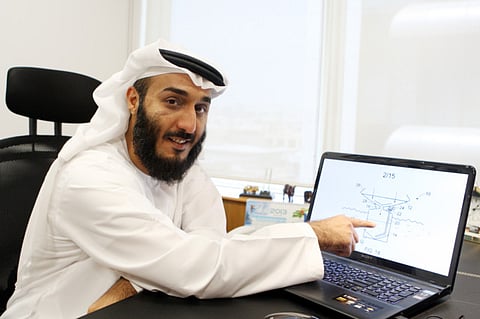Emirati inventor to harvest rainwater in Indian ocean
Al Shehi’s system involves a 20-square-mile collector in the sea to trap 253.6 million litres of rain for use in UAE

ABU DHABI: An Emirati engineer has devised a unique system to harvest rainwater using sea-borne collectors that could one day minimise the need for fuel-intensive seawater desalination.
Abdullah Al Shehi, 31, a UK-trained electrical and electronics engineer, said the massive collectors — up to 20 square miles (52 square km) — could be installed in places with high rainfall such as certain areas of the Indian Ocean, a few hours south of the water-deficient Arabian Peninsula.
Al Shehi, a father of one who grew up in the oasis town of Al Falah near Al Ain, obtained a provisional patent (GB 2493699A) for his invention on February 20, nearly two years after he first filed the application in August 2011.
The British Patent Office granted rights for 10 designs or technical drawings of Al Shehi’s “Alma” (Arabic for water) rainwater collection system.
“It’s a straightforward idea for collecting moisture and rain in the open sea, cost-effectively,” said Al Shehi, who obtained his degree in 2001 from Huddersfield University in West Yorkshire, UK.
The Alma designs which he showed to XPRESS look like upside-down umbrellas or mushrooms. The collectors are linked to reservoirs submerged in the sea and, like buoys, are anchored on the sea-floor.
Al Shehi said he is in talks with institutions in the UAE and US as a project of this magnitude cannot be undertaken by an individual due to the huge upfront cost.
The idea came to him during a week-long holiday in the Maldives. “It was constantly raining during my stay there. And I found that in certain months, the average rainfall can go up to 200mm, which is very good.”
He estimates that a 20-square-mile Alma system exposed to 75mm rainfall per month could collect up to 253.6 million litres a month, roughly equivalent to the monthly water consumption of about 13,000 people in Abu Dhabi.
Besides the huge upfront cost, wouldn’t it be expensive to harvest rainwater? “I don’t think so,” said Al Shehi. “First of all you don’t need land for it. The expense would be in transporting the water collected from one place to another. Once the collectors are in place, then all you do is collect.”
He said the system can be modified and expanded and connected to a system of pipelines. The field can be protected the same way sea-based wind turbines are protected in Europe.
Al Shehi added a command centre will monitor sensors in the reservoir to check water levels or regulate valves using solar energy. “Even if the reservoir overflows, the whole assembly will not capsize.”
But what if it the idea fails to float, or get funding? “I believe an idea has to be tested before it gets rejected,” said the father of one.
In 2008, Al Shehi bought the franchise of Geowash, a mobile water-efficient carwash module, from Argentina which has since grown from 50 carts to 200 today.



